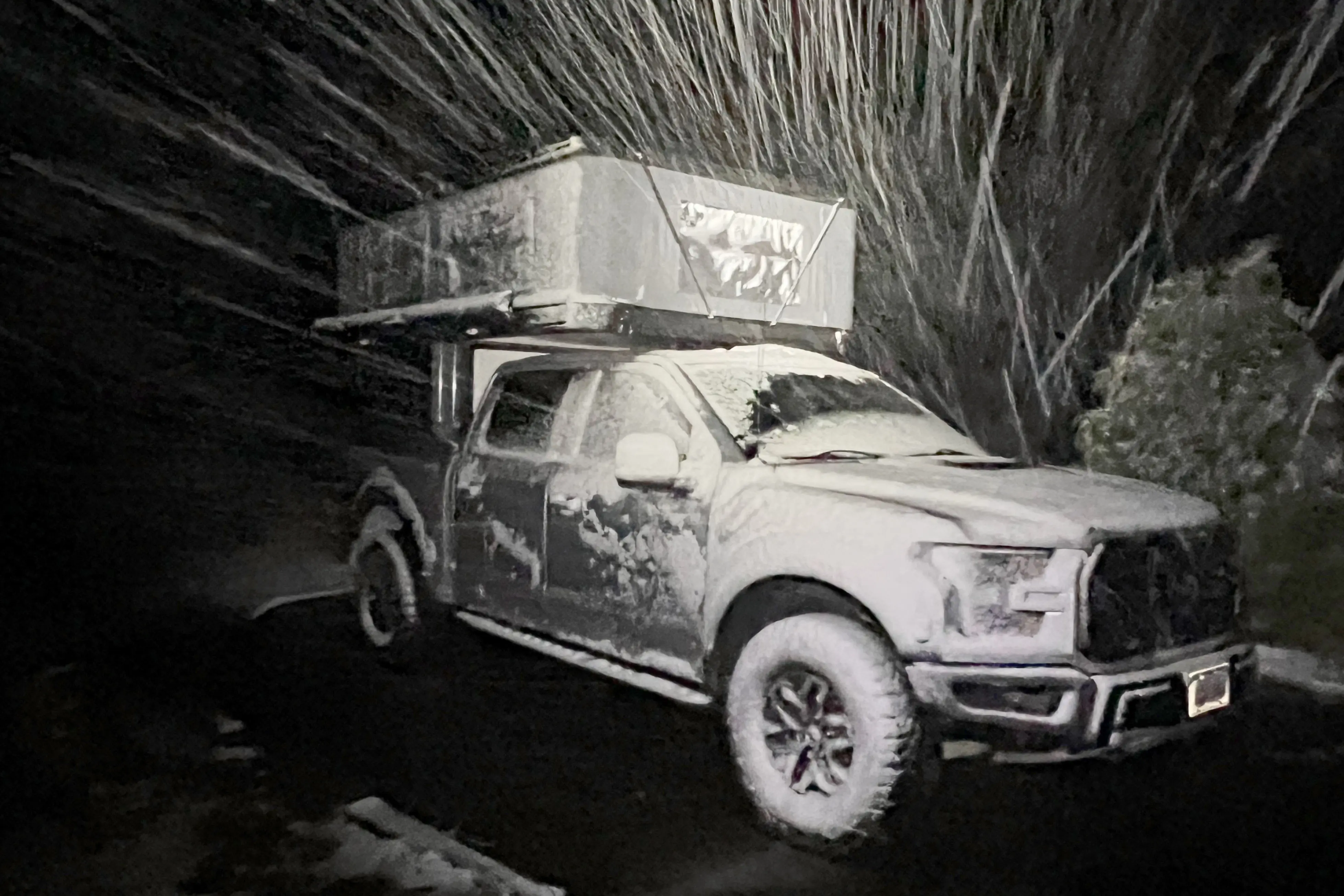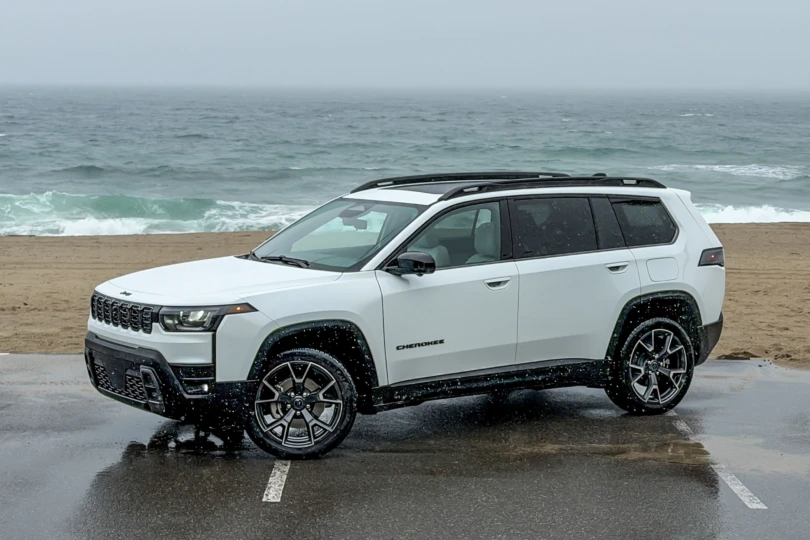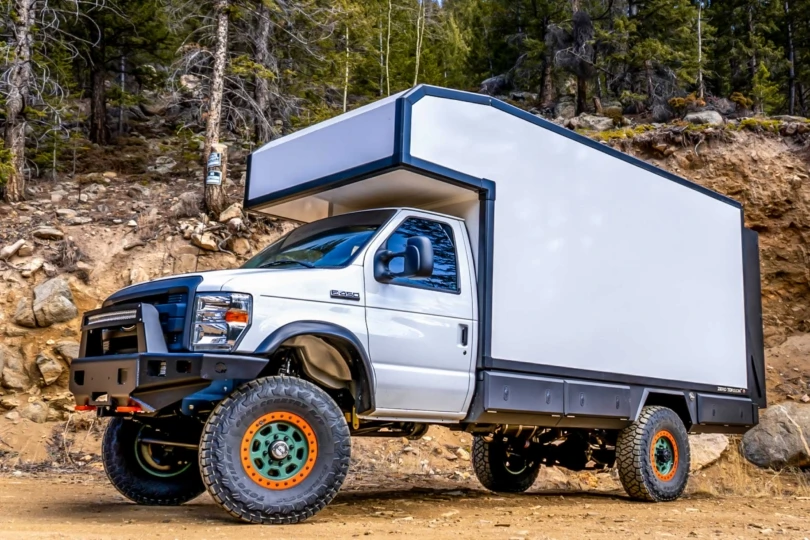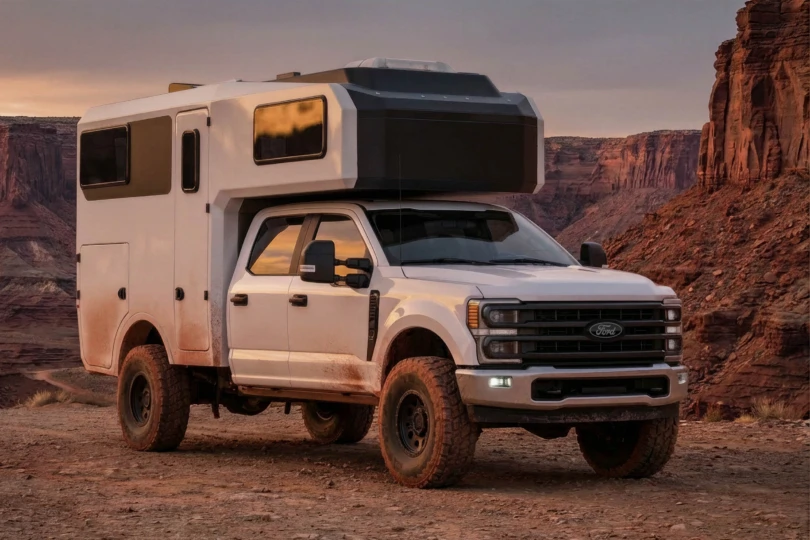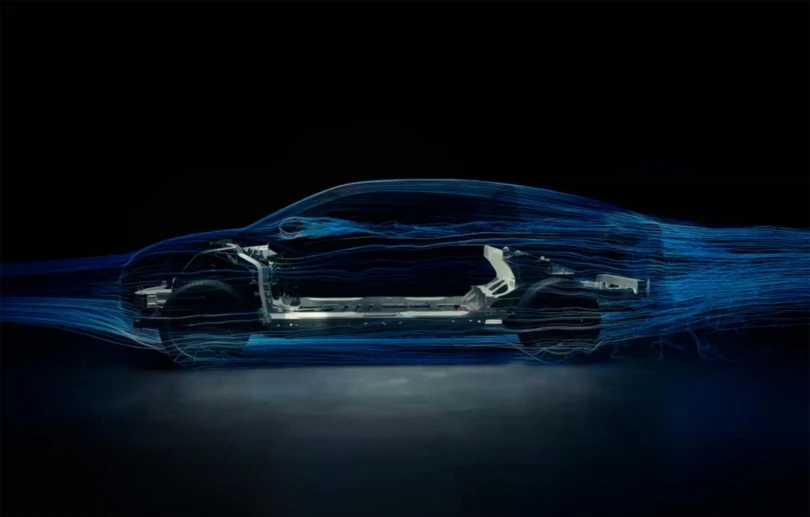The rain turned to snow just as I pulled into the campsite. It was already dusk, and the dark sky and heavy snowflakes instilled a sense of urgency as I backed into a parking space and turned off the pickup.
I opened the door and put up my hood against the wintery wind, buffeting the Tune Outdoor M1 camper bolted to the Ford F-150 Raptor demo truck. This would be one legit test.
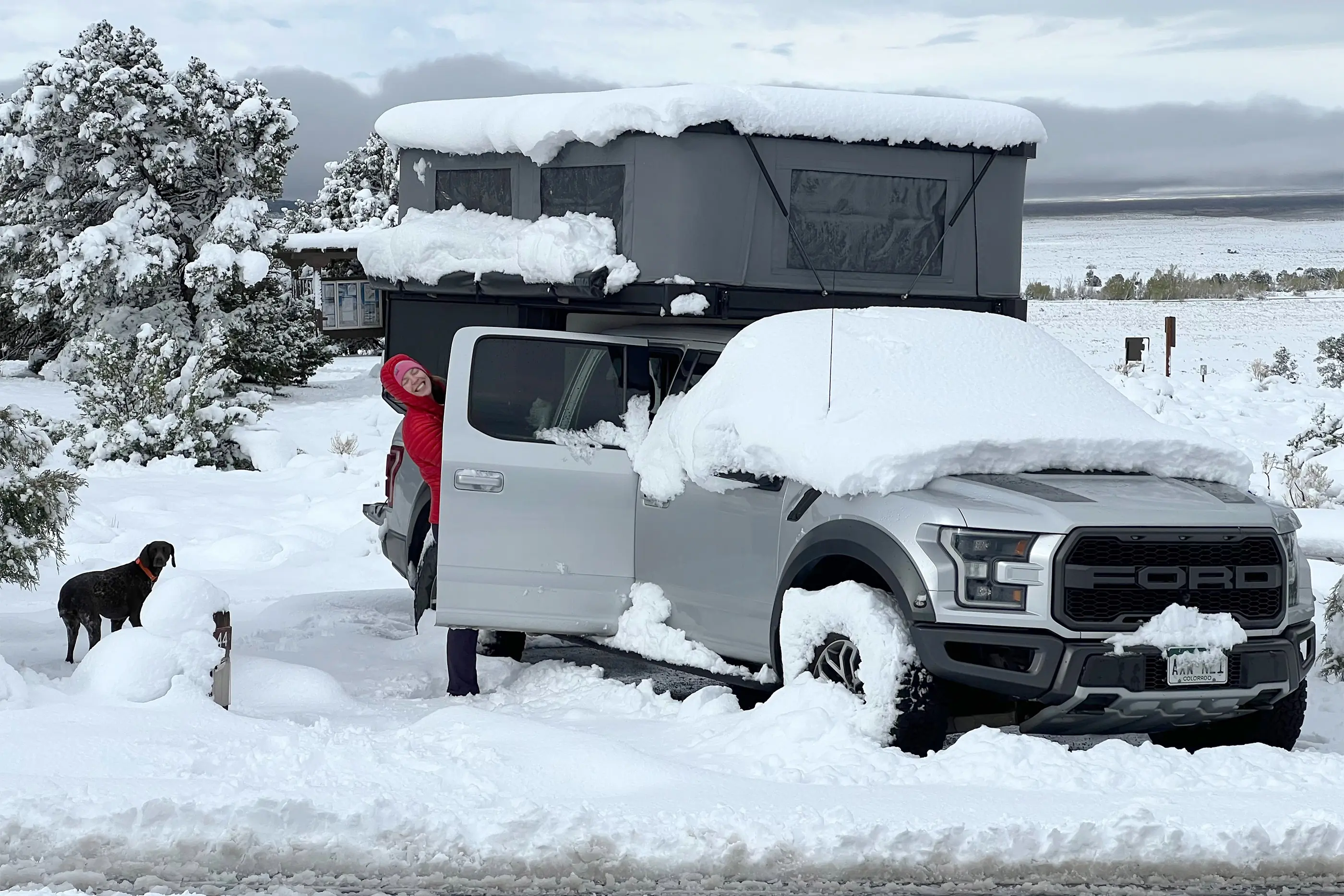
About 10 minutes later, I was inside the expanded camper. The lights were on. The heater was cranking. My wife was organizing gear and seemed pleased with the setup.
I fired up a camp stove and started cooking dinner. Outside, a blizzard had begun to rage. But inside this lightweight camper, it was cozy and warm and starting to smell like sizzling onions.
The forecast was dismal, but this just might not be so bad.
Tune Outdoor M1: A Lightweight Pop-Up for Every Pickup
Before I get into my impressions of the Tune M1, I will provide some background.
The Tune M1 is a light (400 pounds and up) pop-up camper that sits on a pickup truck bed with an extension over the cab. The brand builds the camper specifically for each truck, so it’s a custom product. You can get one for almost any modern pickup truck built after the late ’90s.
It adds about a foot of height to a truck in its lowered position. But popped up, it expands a truck’s height by about 3 feet.
Inside the camper, with the top lowered, you can still access the whole truck bed. It allows the truck to still (sort of) function as a truck.
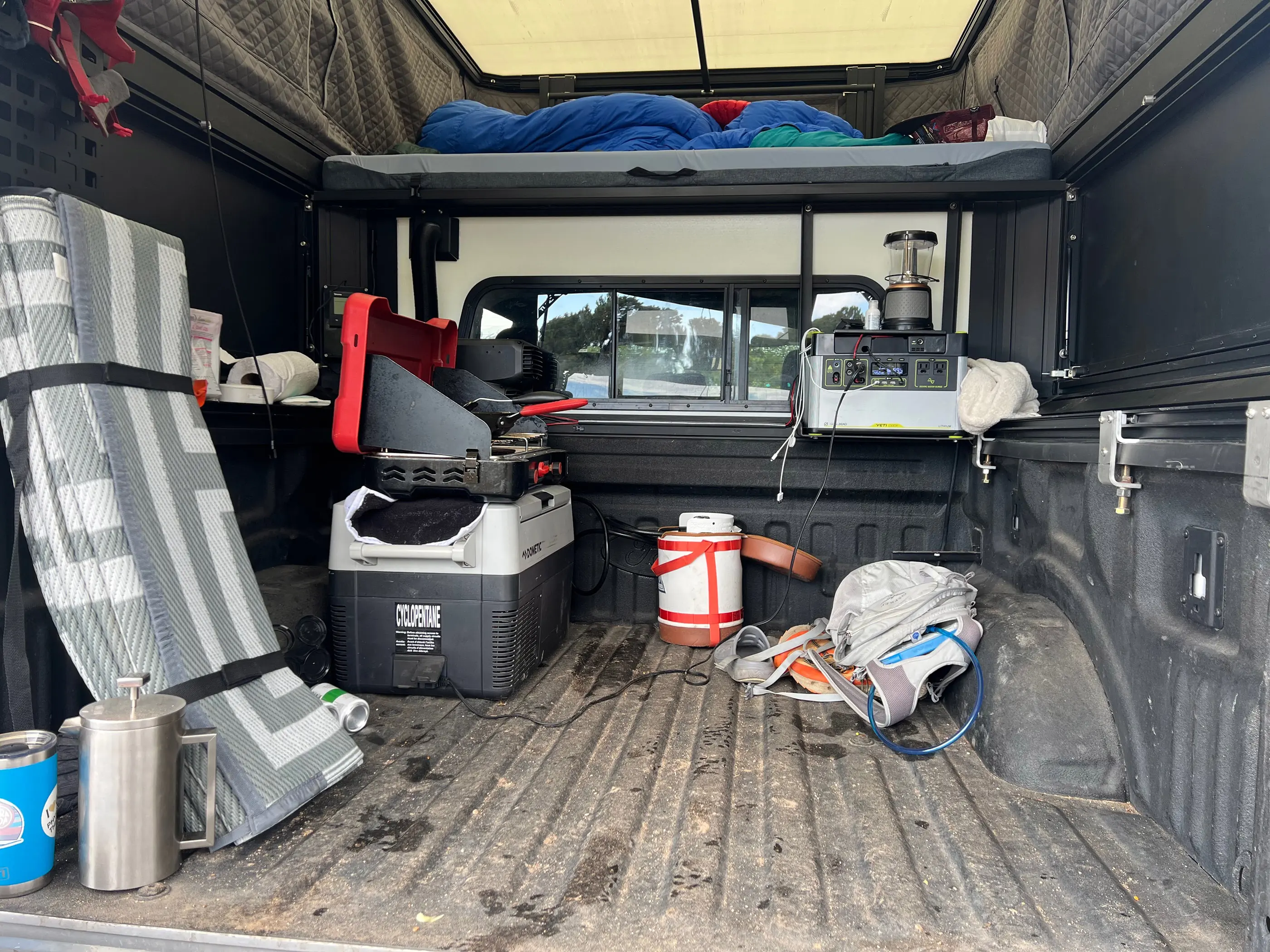
Tune fabricates the sides of the M1 with aluminum and aluminum composite materials. The camper sits out from the sides of the bed, generally matching the exterior wheel wells of the vehicle to provide maximum interior space.
Both sides and the back panel open upward (like the back of a pickup topper), so you can open and access the bed from all three sides, although the primary access is through the tailgate.
The camper is a significant investment, but starting at about $13,000, it hits a price range that competes with many other truck bed camping accessories.
Tune M1 Review: A Weathertight Camper for Offroad Pickups
Back in the campground, the weather got even worse. We ate a quick dinner of mac and cheese and bratwurst, all cooked in the truck’s bed. Then we crawled up onto the Hest Dually Queen mattress and snuggled into our sleeping bags. Wind and snow pelted the roof of the Tune M1, but with the Truma heater set at 55 degrees, I was downright balmy in my 10-degree sleeping bag.
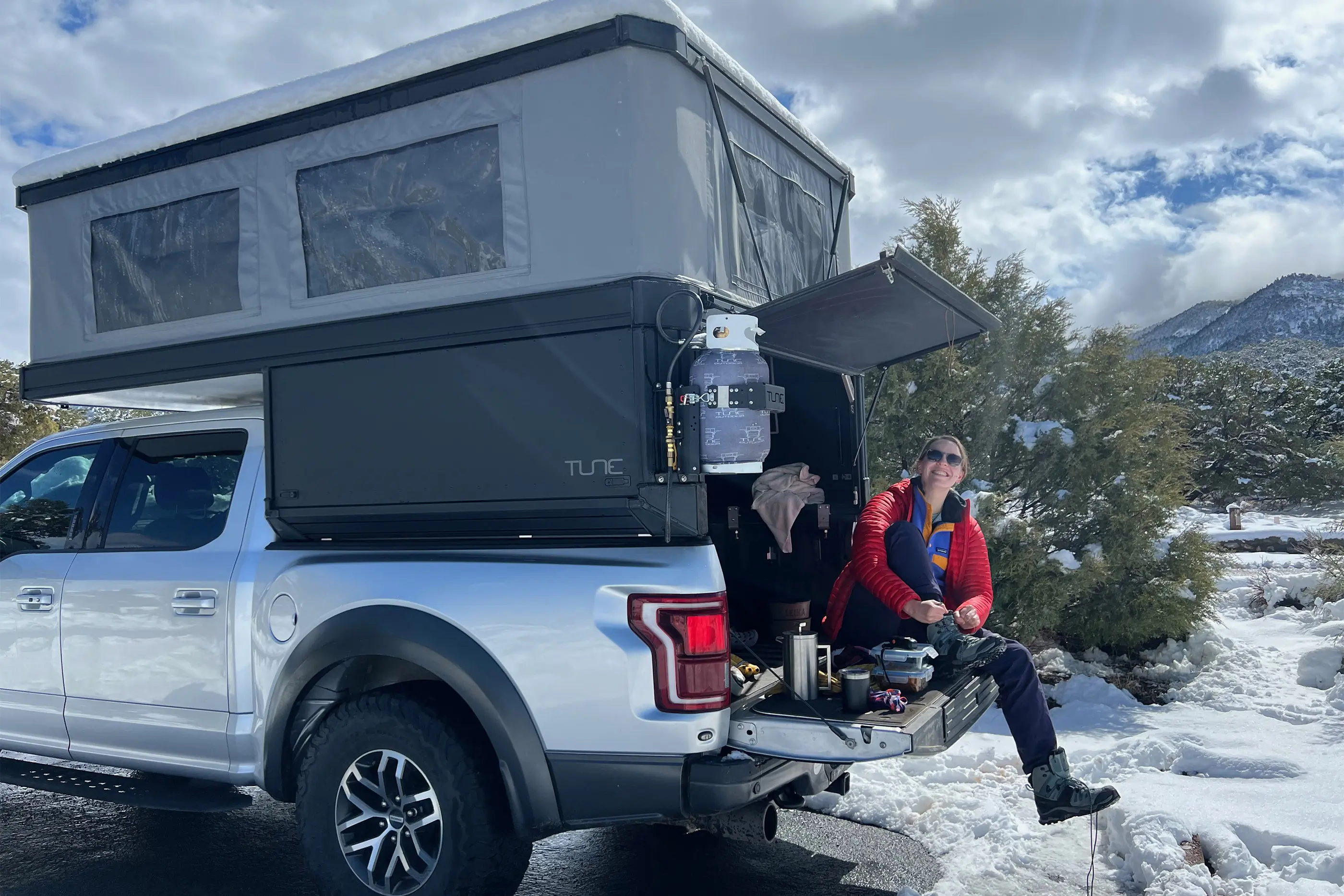



I turned off the heater and lighting and closed my eyes. The next thing I knew, it was morning.
I crawled out of bed and dropped the tailgate. I blinked with shock. Where last night had been bare dirt, more than a foot of heavy, fresh snow now sat. I’d slept through a severe blizzard in a slumberous bliss.
That storm set the stage for 3 nights of consistently bad weather on a Great Sand Dunes National Park trip. Each of the 3 nights, we had a mix of heavy snow, rain, or hail. The weather cleared enough each morning for a lovely hike and exploration of the dunes and surrounding park. But after a few hours of decent weather, the rain socked back each afternoon.
Neither my wife nor myself minded. We’d eat lunch, and then snuggle in for a cozy nap, warm and dry, while listening to the rain on the hard plastic roof.
It was delicious. Tired from long, strenuous hikes each morning, we enjoyed cooking and resting in a well-protected abode. As a lifelong tent camper, my interest in owning a camper was genuinely piqued.
Tune M1 Moisture Management
So, you can see that I liked camping in the Tune M1. It was vastly more comfortable in inclement weather than tent camping or sleeping under an old-school truck topper. But if you’re considering laying out some big coin to buy one, there are many details to consider.
First, I want to mention one negative point I noticed when using the Tune M1: condensation.
The M1 is a hard-sided camper with a fabric extension that allows it to pop up vertically. And the reality is that in cold, wet weather with windows shut, it traps a lot of moisture. That water comes from the vapor you breathe out while sleeping, wet clothes, or boiling water while cooking. And when the moisture in the air hits the cold ceiling or metal beams, it condenses into water.
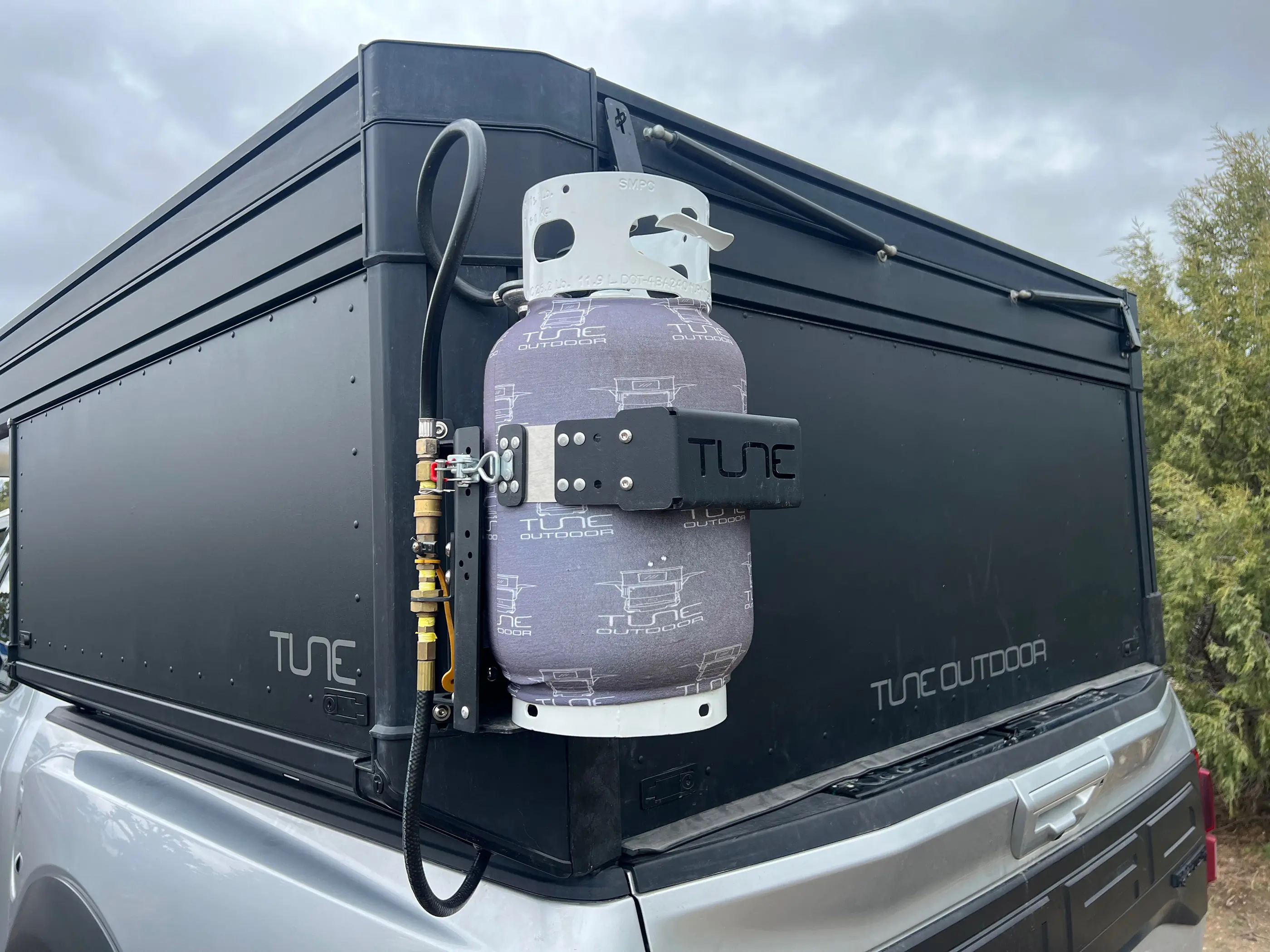



Within an hour of my first night in the Tune M1, I realized that moisture management would be a real issue. Water drops condensed on crossbeams and started dripping on my sleeping bag. Droplets also formed on the sides of the camper and light strip.
Fortunately, there were solutions. We fired up the heater and got the inside warm, and then turned on the nice-quality, powered roof vent to suck out the moisture. Mostly, this technique worked. After cycling through heating and venting a few times, I controlled the moisture. Then, it was a matter of keeping vents open when possible and using the heater (and towels) to dry the inside occasionally.
To be clear, we experienced wet, relatively cold weather in this test. In warmer, dryer weather, moisture would be much less of an issue as you could easily leave a window or two open for venting.
Set Up, Take Down
Here’s one of the best parts of the TUNE M1. Setting up or taking down this system is just a matter of minutes.
I set the TUNE M1 up for the first time while a blizzard was bearing down on us. I was so thankful for how easily it popped up. You unlock a few latches, enter the camper, and pull two levers.
A little pushing upward, and voilà, up it pops! It’s that easy. Once the roof is lifted, you can go inside and shuffle around gear and make the bed (we just used sleeping bags).
Taking it down is similarly simple. Start by putting your camping gear away and clearing the bed space. Then pull a couple of levers and help the roof settle down into the proper alignment. Again, it only took a few minutes and was very easy. Flip a couple of locks, and you’re ready to hit the road.
Considerations
While there are many similar pop-up campers on the market, Tune Outdoor makes a compelling product.
First, it uses a heavy aluminum and composite frame for a stout, rugged product meant for actual off-road use. No, I wouldn’t abuse it by driving overly fast on really bad roads. But consider that your truck bed will also be loaded with camping gear and drive appropriately, and this thing should last a long time.
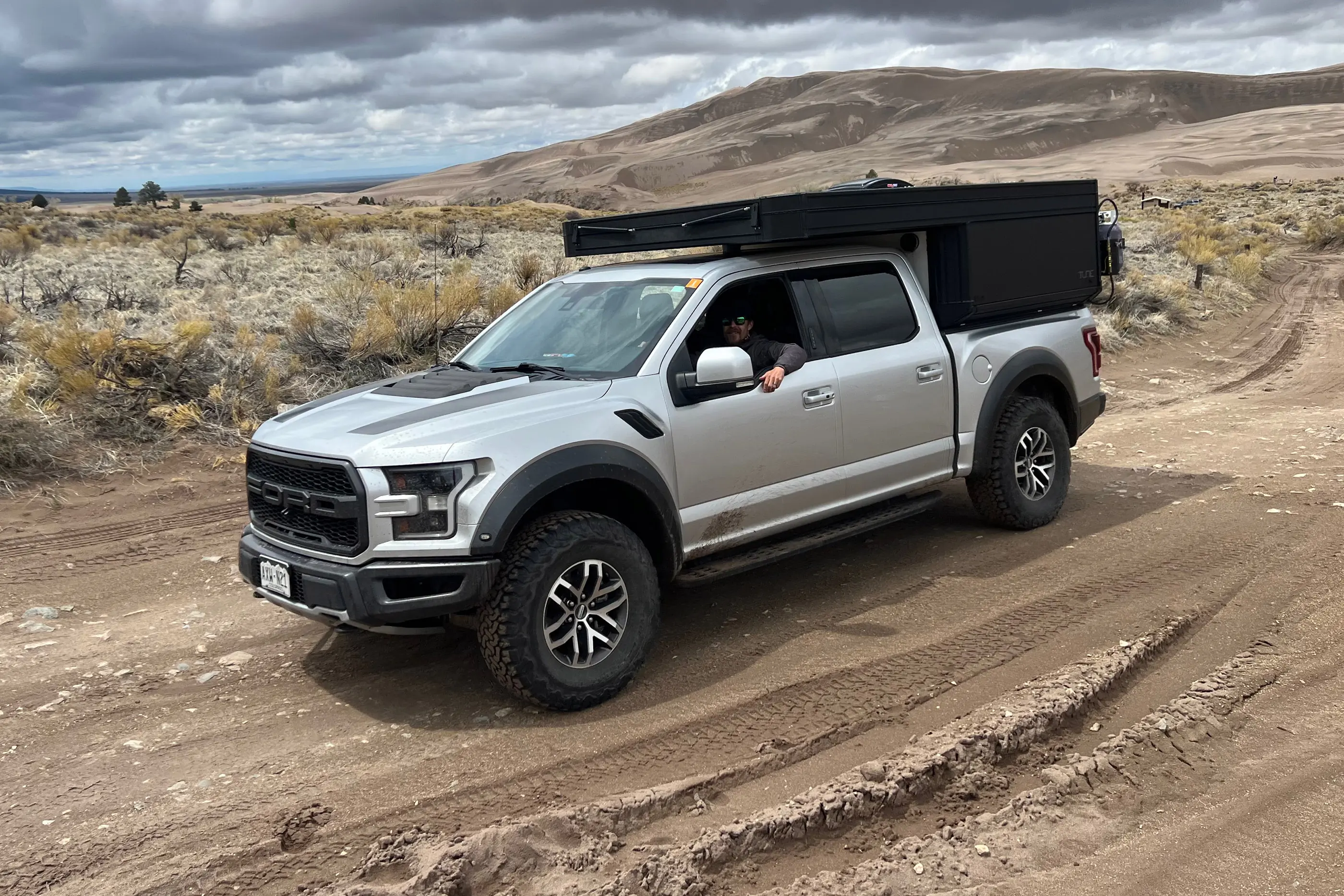



Another positive is that it’s highly modular. Many of the components are interchangeable, so if something breaks, replacing it should be a relatively straightforward process.
Next, I really liked Tune’s use of space. The way the camper bumps out at its junction with the truck bed maximizes interior space. Wall to wall in the model I tested measured 80 inches. That’s 15 inches more than the bed’s width of 65 inches, and that extra width translates all the way up to the top of the camper and the sleeping area.
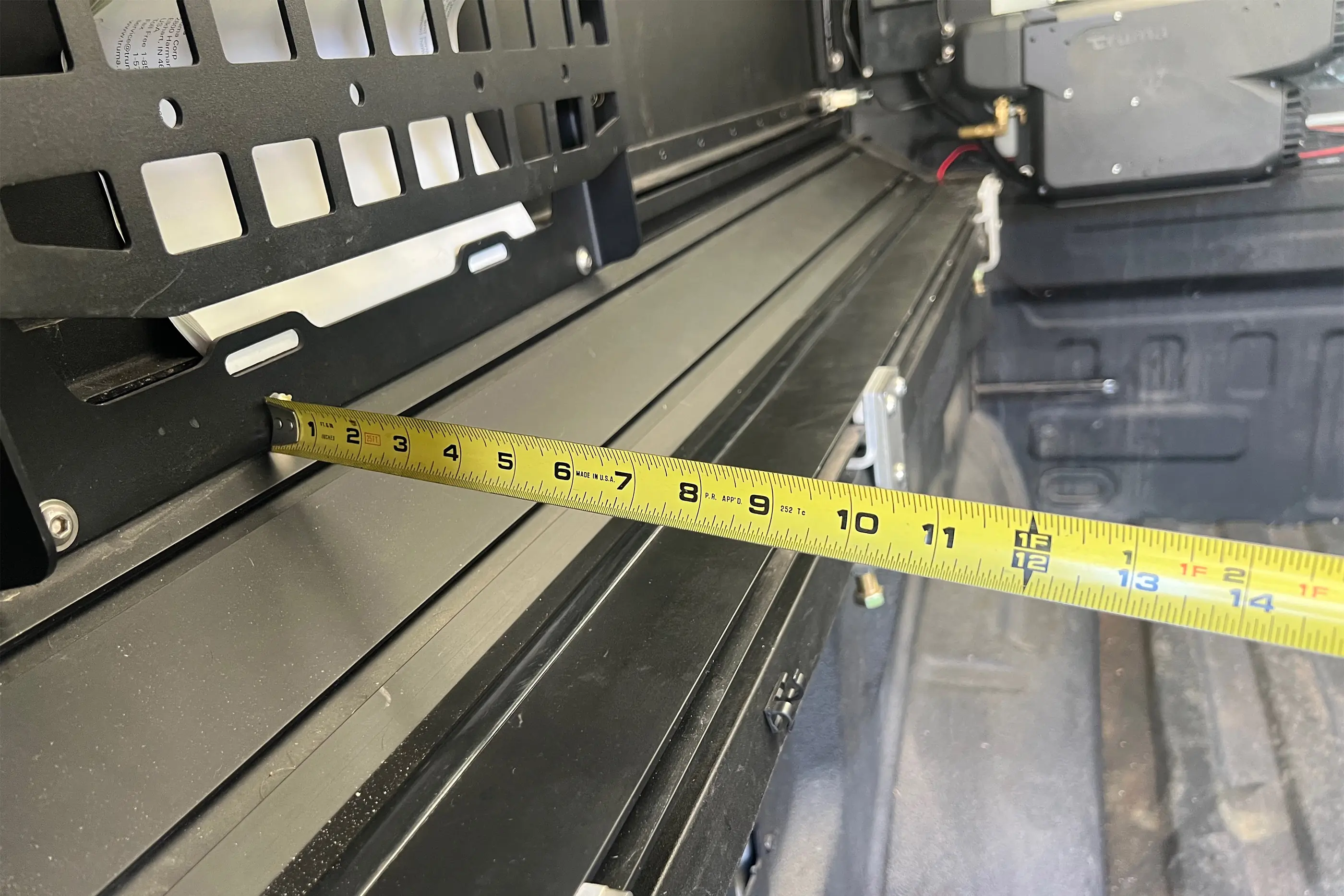



The TUNE M1 uses a lot of T tracks throughout the camper. What that means is that you can attach accessories all over the place. In 3 days, I already thought of a half-dozen additions I’d build to make the camper my own. Fortunately, ready-made products exist in most cases, and I could just buy them and bolt them on.
Tune M1 Camper Review: Entry & Exit
Another point to consider when shopping for this product is the entry and exit system. You climb in and out of a truck bed whenever you want to enter or exit the camper. If you’ve ever climbed into a pickup truck with a topper, well, you’ve experienced it.
It’s not hard, but it’s also not the most comfortable thing in the world. And on a bigger pickup, getting down can be a legit jump. For those with less mobility, some kind of stairs or step stool would be a good idea. And keep in mind that, due to the way the topper opens, you kind of have to stoop when under the opening.
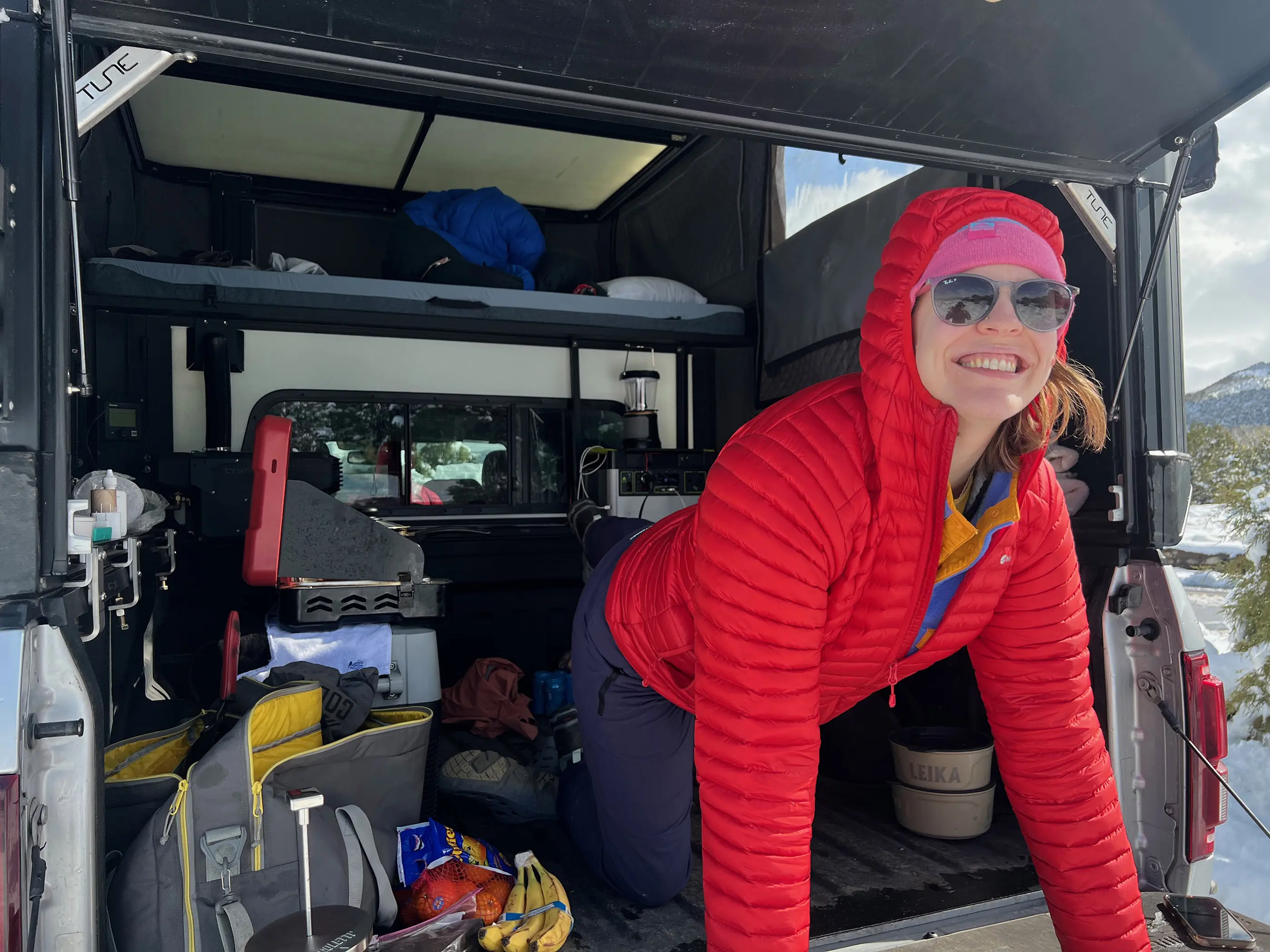



While other pop-up truck bed campers do not use the tailgate and instead have a full door, there are benefits to Tune’s design. The primary pro here is that you have full truck bed access. For loading gear, it’s the best route. It’s just not the easiest when hopping in and out at a campground all weekend.
Should You Buy a Tune M1 Pop-Up Camper?
After 3 days of camping, sleeping, cooking, and generally living in a Tune M1 camper reviewed here, I’m legitimately considering one of my own. Should you?
I would say yes if you meet a few criteria. First, you need a good pickup. The Tune M1 is going to last a long time, so I would want to build mine to a truck I plan to own for several years.
Next, you should want a camper that emphasizes outdoor living. Sure, the Tune M1 provides adequate living space for two people to cook, change clothes, and hang out in bad weather. But it’s not exactly comfortable, and if you’re stuck inside for more than an hour or two, you’ll probably wind up in bed taking a nap.




That’s to say, this isn’t an RV. There’s no couch, no built-in kitchen. It’s a rustic abode that works great as a bed and basic shelter. It’s tough, allowing you to haul gear into remote places. It’ll give you a great night’s sleep, even in a blizzard.
I’d strongly consider one if this speaks to your camper’s heart. For me, it’s a compelling camper that I’d love to own for some very specific hunting, hiking, and travel-oriented adventures. It handles the weather much better than a basic camp tent.
And, with a heater and vent, you’ll sleep soundly, knowing that it can handle most anything nature will likely throw its way.
Find out more about all the Tune M1 pop-top truck camper has to offer at TuneOutdoor.com.
